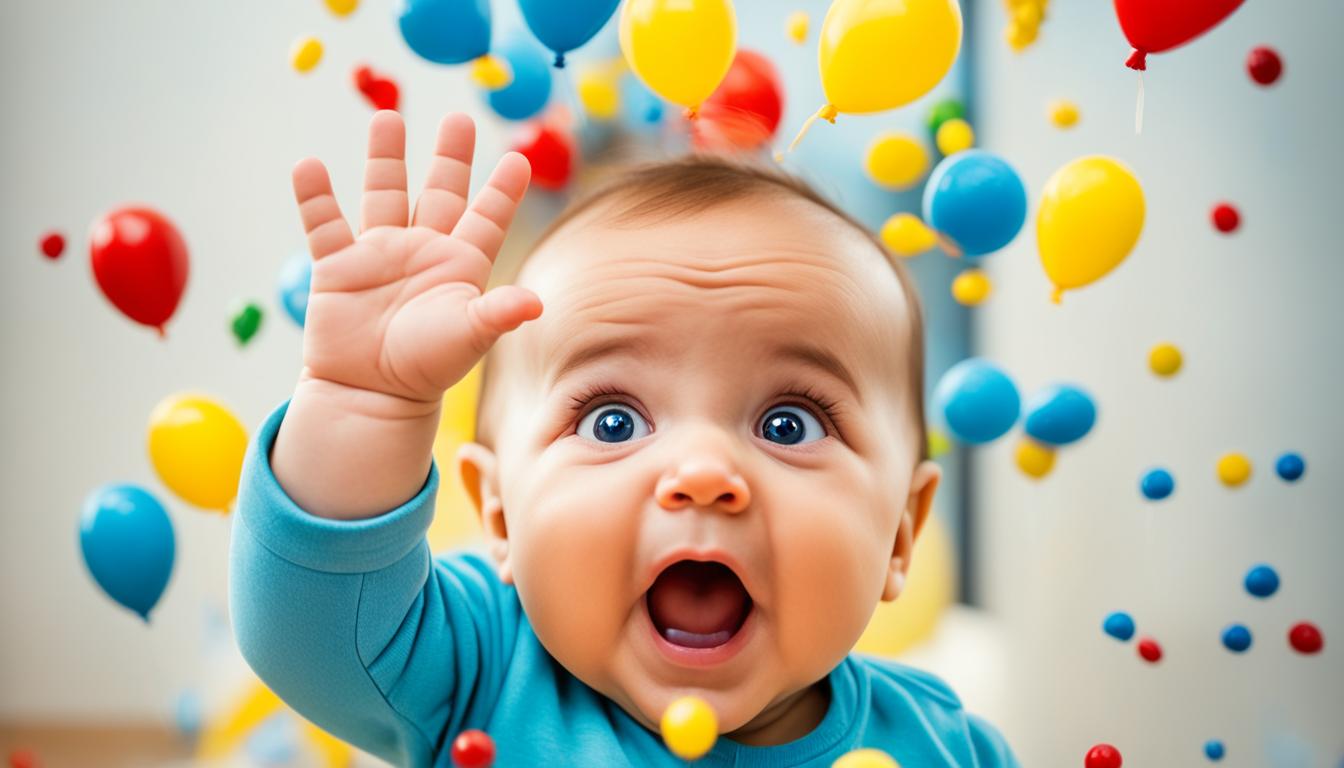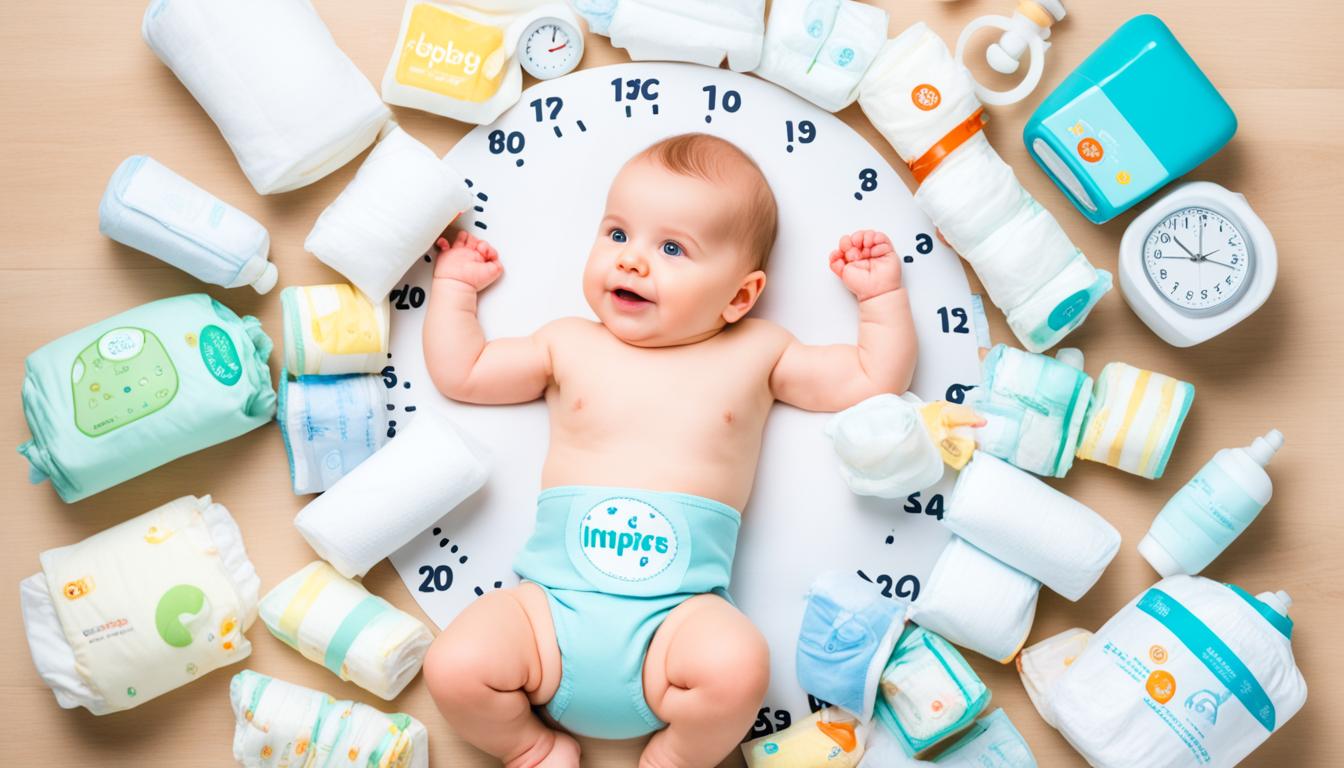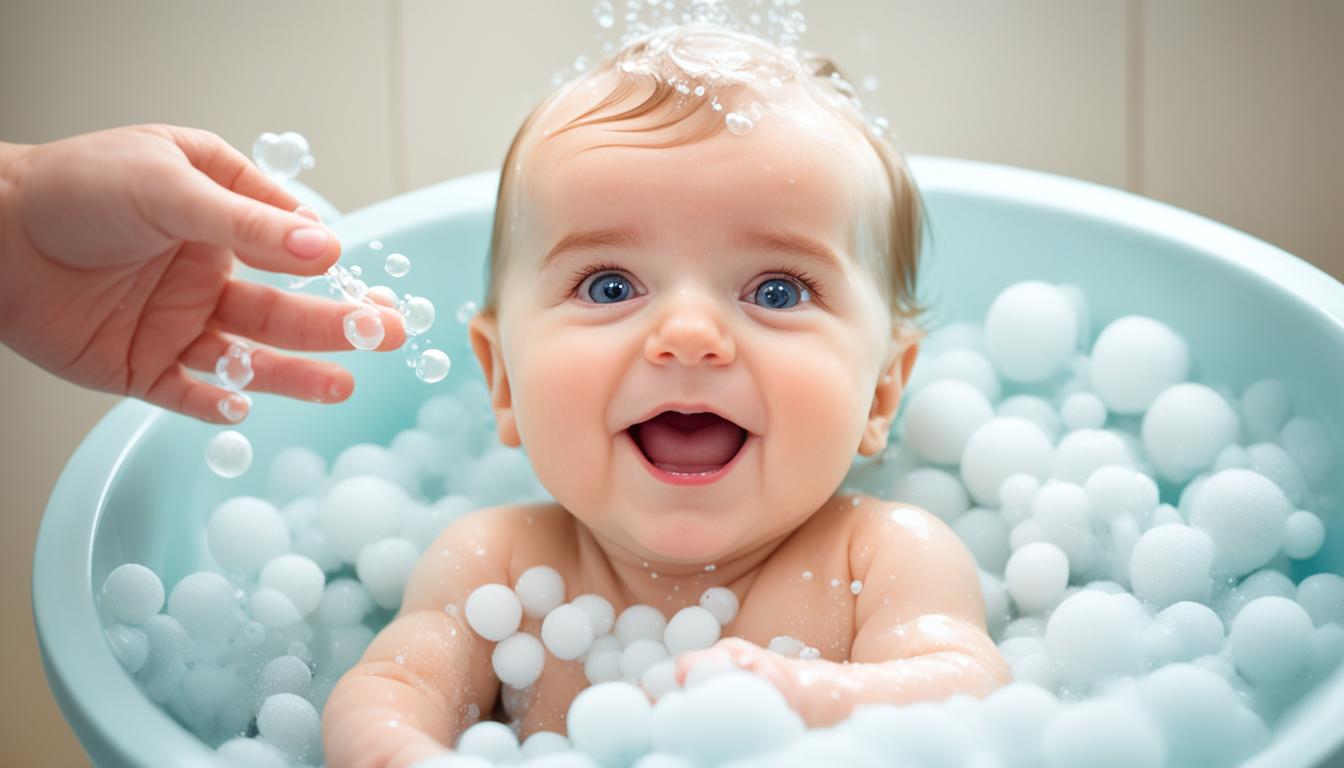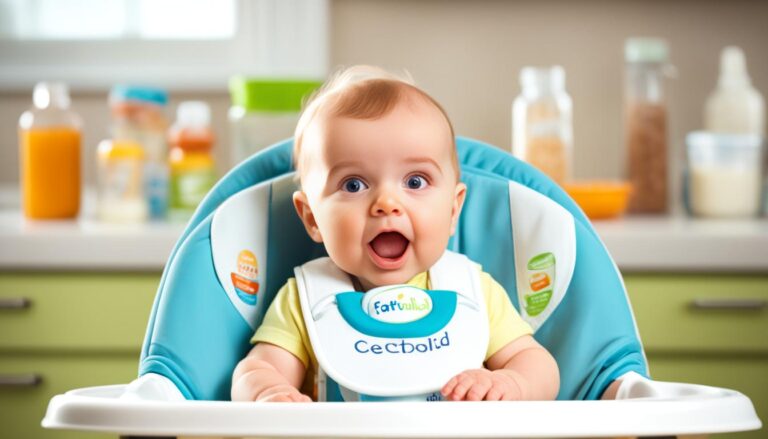Can Babies Sense Emotions? Understanding the Emotional Awareness of Infants
As a journalist specializing in early childhood development, I am often amazed by the incredible capabilities of infants. It’s fascinating to witness how these tiny beings perceive and interact with the world around them. One aspect that has caught my attention is their remarkable ability to understand and sense emotions. In this article, we will explore the emotional development of babies and delve into how they perceive and respond to different feelings.
Skip To The Following Sections
- Infants’ Emotional Intelligence and Bonding
- Babies’ Language and Communication Skills
- Infants’ Mathematical and Scientific Abilities
- Multilingualism in Infants
- Infants’ Facial Recognition Skills
- Babies’ Sense of Rhythm and Music
- Infants’ Understanding of Emotional Reactions
- FAQ
- Can babies sense emotions?
- How do babies perceive emotions?
- What is emotional intelligence in babies?
- How do emotions and bonding with babies relate?
- How do babies develop language and communication skills?
- What are the benefits of learning sign language as a baby?
- Do babies have mathematical and scientific abilities?
- Can infants learn a second language?
- How do babies recognize familiar faces?
- Can babies respond to rhythm and music?
- How do infants understand and respond to emotional reactions?
- Source Links
Key Takeaways:
- Babies possess the ability to recognize and differentiate between various emotions from a young age.
- They show empathy and demonstrate a preference for comforting individuals in distress.
- Infants’ emotional intelligence and bonding with caregivers are closely intertwined.
- Parental expressions and emotions play a crucial role in infants’ emotional development.
- Introducing sign language to babies can enhance their communication skills and cognitive development.
Infants’ Emotional Intelligence and Bonding
When it comes to understanding emotions, babies have a remarkable ability to connect and empathize with others. They actively care about their caregivers’ emotions and show a preference for figures that display distress. This early display of empathy highlights the emotional intelligence that babies possess from a very young age.
Parental expressions and emotions play a vital role in infants’ emotional intelligence development. Babies are highly perceptive and sensitive to their parents’ emotional cues. They use these cues to interpret and react to the world around them, forming a strong bond with their caregivers.
In a study conducted by researchers at the University of Cambridge, it was found that babies as young as six months old are capable of recognizing emotions such as happiness, surprise, and anger. This ability to understand and respond to emotional cues in others contributes to the development of their own emotional intelligence.
“Babies are like sponges, absorbing and learning from the emotional environment they are exposed to. Positive emotional expressions from caregivers can promote a sense of security and trust in infants, fostering their emotional development.”
Infants rely on their caregivers as a source of emotional guidance and regulation. By observing their parents’ expressions, infants learn to understand and express their own emotions. This understanding is crucial for developing healthy emotional relationships and forming strong bonds with others.
Bonding with babies is not just about meeting their physical needs, but also about nurturing their emotional well-being. When caregivers respond to their infants’ emotional cues in a sensitive and loving manner, it reinforces the baby’s sense of safety and security. This secure attachment forms the foundation for healthy emotional development and lifelong relationships.
Understanding Baby’s Emotions
Babies may not have the ability to communicate their emotions verbally, but they express themselves through various emotional cues. As caregivers, it is essential to recognize and understand these cues to provide the necessary support and care for your baby’s emotional well-being.
Some common emotional cues in infants include:
- Crying: Crying is an infant’s primary means of communication. It can indicate a range of emotions, including hunger, discomfort, fear, or fatigue.
- Facial expressions: Babies often convey their emotions through facial expressions. Smiling, frowning, or furrowing their brows can indicate their level of comfort or discomfort.
- Body language: Pay attention to your baby’s body language. Tensing up or arching their back may signal distress, while relaxed and open postures indicate contentment.
- Vocalizations: From coos to gurgles, babies use a variety of vocalizations to express their emotions. Pay attention to the tone and pitch of their sounds, as they can convey happiness, frustration, or discomfort.
By being attuned to your baby’s emotional cues and responding with care and empathy, you can foster their emotional development and strengthen the bond between you.
Now that we understand the importance of emotional intelligence and bonding in infants, let’s explore how babies develop language and communication skills in Section 3.
Babies’ Language and Communication Skills
Infants have remarkable abilities when it comes to language and communication, starting from a very early age. By understanding and responding to emotional cues, babies can navigate their social environments and form deep connections with their caregivers.
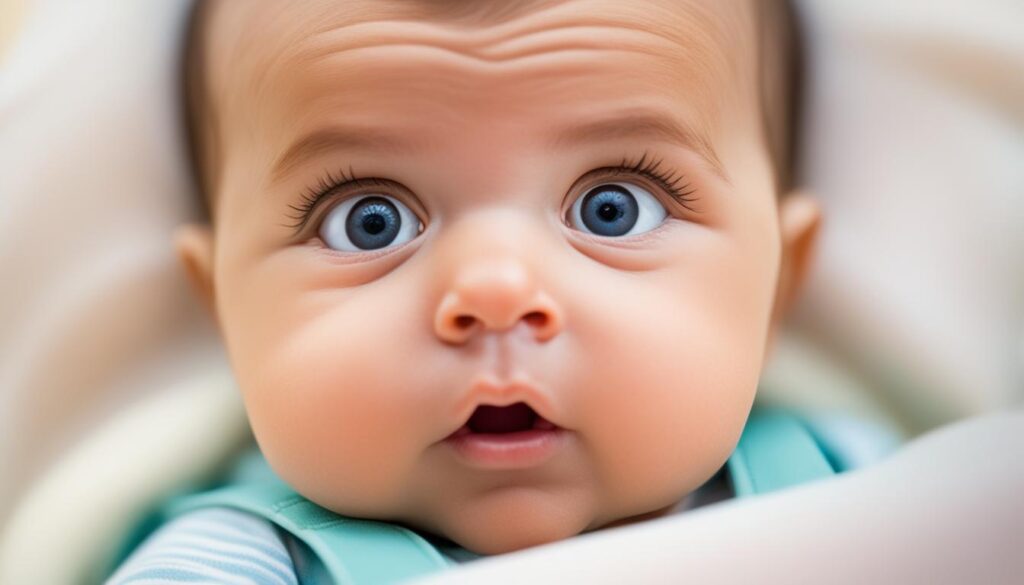
One fascinating aspect of infants’ language development is their eagerness to learn sign language before they can speak. Using sign language can help babies effectively communicate their needs and desires, even before they have mastered verbal communication. It enhances their cognitive development and stimulates their emotional responsiveness.
“Introducing signing early can create pathways in the brain that make learning any language easier later in life.”
- Expanded Vocabulary: Babies who use sign language before they start speaking tend to have larger vocabularies. The act of signing facilitates their understanding of concepts and words, enabling them to express themselves more effectively.
- Higher Intelligence Scores: Research shows that babies who learn sign language early on tend to score higher on intelligence tests. Sign language engages different areas of the brain, promoting cognitive development and problem-solving skills.
It’s important to note that introducing sign language to infants does not hinder the development of spoken language. On the contrary, it complements verbal communication and provides a foundation for building language skills. It also helps infants recognize emotions in themselves and others, fostering their emotional development.
The Power of Communication
Babies’ natural inclination to use sign language demonstrates their remarkable emotional responsiveness and ability to recognize emotions in newborns, both in themselves and in those around them. The early introduction of signing sets the stage for strong language and communication skills, empowering infants to express themselves, understand others, and form meaningful connections.
Infants’ Mathematical and Scientific Abilities
It may come as a surprise, but babies possess innate mathematical abilities and problem-solving skills that demonstrate their remarkable cognitive development. Even at such a young age, infants showcase an understanding of basic subtraction and logical reasoning.
Research has shown that babies can recognize statistical mismatches and comprehend that two minus one does not equal two. This early grasp of mathematical concepts is a testament to their emerging problem-solving skills and cognitive flexibility.
Encouraging daily exploration and providing age-appropriate toys that foster creativity can further enhance babies’ mathematical and scientific learning. By engaging them in activities that stimulate their curiosity, we can lay a strong foundation for their future academic success.
Fostering Mathematical Abilities in Infants
Here are some strategies to nurture babies’ mathematical and scientific abilities:
- Introduce toys and puzzles that encourage problem-solving and critical thinking, such as shape sorters and stacking blocks.
- Create an environment that promotes curiosity and exploration, allowing infants to discover patterns and make connections.
- Engage in interactive play that involves counting objects, identifying shapes, and exploring cause-and-effect relationships.
- Read books that incorporate numbers, shapes, and basic mathematical concepts into their narratives.
- Utilize everyday experiences, such as mealtime or bath time, to introduce mathematical concepts like counting, measuring, and comparing quantities.
By integrating these strategies into daily routines and playtime, parents and caregivers can support infants in developing a strong foundation in mathematics and scientific thinking. Remember, every interaction is an opportunity for growth and learning.
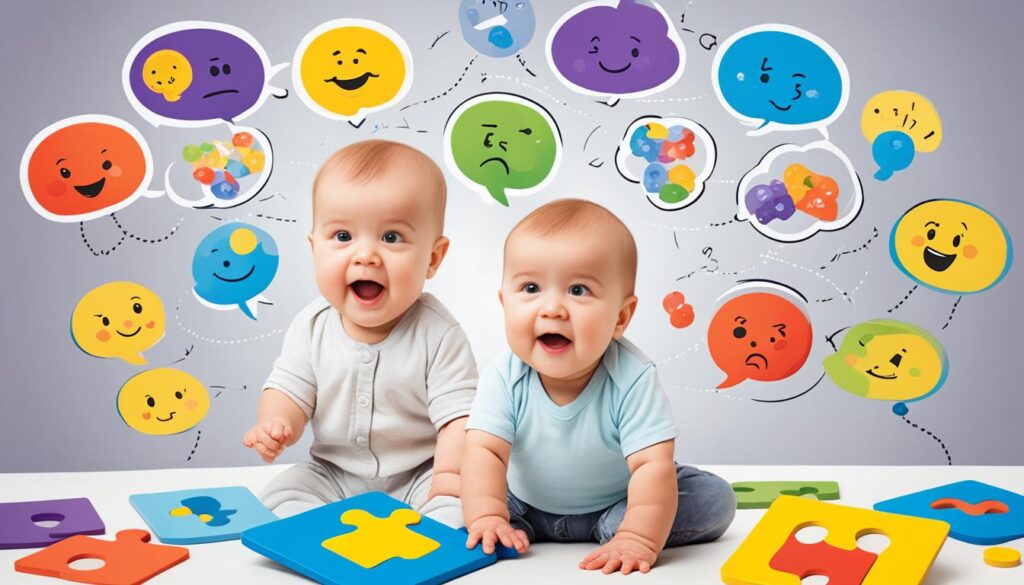
Multilingualism in Infants
Infants have a remarkable capacity for language learning, including the ability to acquire multiple languages at a young age. The benefits of learning a second language as a child are extensive, with profound effects on cognitive development and cultural understanding.
Research suggests that exposing infants to a second language from an early age enhances their flexible thinking, memory retention, and concentration skills. Additionally, multilingualism has been shown to improve problem-solving abilities and promote better executive functioning.
Studies have also indicated that even very young infants can distinguish between words in different languages. This early exposure lays the foundation for language development and facilitates later language acquisition.
Furthermore, being bilingual or multilingual offers numerous cognitive advantages throughout life. Bilingual individuals tend to demonstrate greater creativity, critical thinking abilities, and mental flexibility. They also often exhibit enhanced communication skills and are more receptive to diverse cultures and perspectives.
To foster multilingualism in infants, parents can introduce a second language through various means, such as speaking the language at home, engaging in language-based activities, or enrolling their child in language immersion programs. Providing a rich language environment that includes exposure to native speakers, books, and audio materials can effectively support language learning.
In conclusion, promoting multilingualism in infants offers invaluable cognitive benefits and nurtures a global mindset from an early age. Harnessing their inherent language learning capabilities empowers them to connect with diverse communities and thrive in an increasingly interconnected world.
Benefits of Learning a Second Language as a Child:
- Enhances flexible thinking and cognitive abilities
- Improves memory retention and concentration skills
- Fosters problem-solving and executive functioning
- Develops creativity and critical thinking
- Facilitates better communication and cultural understanding
Table: Comparative Analysis of Monolingual and Multilingual Infants
| Skills | Monolingual Infants | Multilingual Infants |
|---|---|---|
| Flexible Thinking | Standard | Enhanced |
| Memory Retention | Average | Improved |
| Concentration Skills | Standard | Enhanced |
| Problem-Solving Abilities | Standard | Advanced |
| Creativity | Standard | Enhanced |
| Critical Thinking | Standard | Enhanced |
Infants’ Facial Recognition Skills
Infants have an incredible ability to recognize familiar faces, including those of their parents, from a very early age. By the time they are 5 to 8 months old, babies can distinguish between familiar people and strangers. This remarkable skill showcases their innate capacity for facial recognition.
Continued exposure to faces from diverse ethnic groups can further enhance infants’ facial recognition abilities and extend them into adulthood. Research suggests that early exposure to a variety of faces helps infants develop a broader visual schema, making it easier for them to identify and differentiate between different faces as they grow.
Parents play a crucial role in promoting their baby’s facial recognition skills. By providing exposure to diverse faces through books, images, and interactions with individuals from different ethnic backgrounds, parents can help their infants hone this skill.
The Power of Facial Recognition
Facial recognition is a vital aspect of social development and communication for infants. By recognizing familiar faces, babies can form bonds and connections with their caregivers and other significant individuals in their lives. This recognition also helps establish a sense of security and belonging.
“Babies’ ability to recognize facial expressions and familiar faces is a vital foundation for their emotional development and their ability to form secure attachments.”
Fostering Facial Recognition Skills
There are various strategies parents can employ to stimulate and enhance their baby’s facial recognition skills:
- Provide exposure to diverse faces through books, photographs, and educational materials.
- Engage in face-to-face interactions, making eye contact and using exaggerated facial expressions.
- Encourage interactions with individuals from different ethnic backgrounds, promoting exposure to a variety of facial features and expressions.
- Play games that involve pointing out familiar faces in photographs or videos.
By incorporating these practices into daily routines, parents can help their infants develop strong facial recognition abilities, ultimately supporting their overall cognitive and social development.
Babies’ Sense of Rhythm and Music
Babies have an innate sense of rhythm and a natural inclination towards music. From the moment they are born, they have the capability to detect beats in rhythmic sound sequences. When they hear music, they respond by moving their arms and body in sync with the rhythm. This instinctive response to music highlights the connection between rhythm and movement, which is an essential aspect of a baby’s development.
Music and rhythm play a significant role in a baby’s cognitive, emotional, and physical development. By exposing babies to different musical genres and incorporating rhythm into their daily activities, parents can foster their musical abilities and stimulate their overall development. Rocking a baby to the beat while singing songs not only enhances their sense of rhythm but also strengthens the bond between parent and child through the shared experience of music.
“Babies have a remarkable sense of rhythm and a natural affinity for music. By incorporating music into their daily routines and exposing them to various musical experiences, parents can nurture their love for music and support their overall development.”
Research studies have shown that music has a profound impact on a baby’s brain development. It helps improve their auditory processing skills, memory retention, and language acquisition. Babies who are exposed to music from an early age also tend to have better spatial-temporal skills and enhanced cognitive abilities.
Furthermore, music has a positive effect on a baby’s emotional well-being. It can soothe and comfort them, regulate their emotions, and provide a sense of security and familiarity. Singing and dancing with a baby creates a joyful and stimulating environment, encouraging their creativity and self-expression.
Parents can introduce different musical activities to enhance a baby’s sense of rhythm and musicality. Playing musical instruments, singing nursery rhymes, and engaging in interactive music sessions can all contribute to their musical development. Additionally, attending music classes specifically designed for babies can provide them with a structured learning environment and further nurture their musical skills.
Baby’s Sense of Rhythm: Benefits for Development
The ability to sense rhythm and respond to music offers numerous benefits for a baby’s development:
- Enhances cognitive skills: Babies who are exposed to rhythmic patterns and musical sequences develop stronger cognitive abilities, including attention, memory, and problem-solving skills.
- Supports language development: The rhythmic patterns and melodic qualities of music help stimulate a baby’s language acquisition and assist in developing their verbal communication skills.
- Fosters physical coordination: Moving to the beat of music improves a baby’s motor skills, coordination, and body awareness.
- Promotes social interaction: Participating in musical activities with others, such as singing in a group or dancing together, promotes social bonding and encourages communication and cooperation.
- Boosts emotional well-being: Music has a profound impact on a baby’s emotional state, helping to regulate and express emotions, reduce stress, and promote a sense of happiness and relaxation.
By recognizing and nourishing a baby’s sense of rhythm and fostering their musical development, parents can provide them with a strong foundation for lifelong appreciation and enjoyment of music. Additionally, incorporating music into a baby’s daily routine can create a stimulating and enriching environment that promotes holistic development.
Infants’ Understanding of Emotional Reactions
By the time infants reach 18 months old, they demonstrate a remarkable understanding of human emotions. They possess the ability to perceive emotional cues and respond accordingly. From a young age, babies can differentiate between overt displays of sadness and more subtle, emotionally reserved responses.
Infants also have the capacity to associate specific events with corresponding emotions. They are able to deduce appropriate emotional reactions based on the context of a situation. This early emotional comprehension allows babies to navigate their environment and react in ways that align with societal expectations.
Observing others’ emotional reactions plays a significant role in infants’ emotional development. Through this observation, they learn about their own emotions and begin to develop empathy towards others. By witnessing and interpreting the emotional responses of those around them, infants gain valuable insights into the complexities of human emotions.
FAQ
Can babies sense emotions?
Yes, infants possess a formidable skill set and are sensitive to emotions. They can recognize the difference between happy and sad expressions by just a few months old.
How do babies perceive emotions?
Babies actively care about their caregivers’ emotions. They show empathetic preferences towards figures that display distress. Parental expressions and emotions play a crucial role in infants’ emotional intelligence development.
What is emotional intelligence in babies?
Emotional intelligence in babies refers to their ability to recognize and understand emotions in themselves and others, and to respond appropriately. They are sensitive to their parents’ emotional cues and use them to interpret and react to the world around them.
How do emotions and bonding with babies relate?
Positive emotional expressions from caregivers promote feelings of security in infants. Bonding with babies through emotional responsiveness helps develop their emotional intelligence and strengthens the caregiver-infant relationship.
How do babies develop language and communication skills?
Infants are eager to learn sign language before they can speak. Using sign language helps them communicate their needs and enhances their cognitive development. Babies who use sign language before speaking tend to have larger vocabularies and score higher on intelligence tests.
What are the benefits of learning sign language as a baby?
Introducing sign language early can create pathways in the brain that make learning any language easier later in life. It enhances infants’ communication skills and can foster their cognitive development.
Do babies have mathematical and scientific abilities?
Yes, babies have a basic sense of subtraction and can solve problems using scientific logic. They can understand that two minus one doesn’t equal two and can recognize statistical mismatches. Daily exploration and providing toys that encourage creativity can further enhance their math and science learning.
Can infants learn a second language?
Yes, infants have the innate ability to learn a second language. Being multilingual enhances their flexible thinking, memory, and concentration. Exposing them to a second language from an early age can help them become bilingual and reap the cognitive benefits associated with multilingualism.
How do babies recognize familiar faces?
Infants can recognize familiar faces, including their parents’, from a very early age. By 5 to 8 months old, they can differentiate between familiar people and strangers. Continued exposure to faces from diverse ethnic groups can help extend their facial recognition abilities into adulthood.
Can babies respond to rhythm and music?
Yes, babies have the capability to detect beat in rhythmic sound sequences from birth. They respond to the rhythm of music by moving their arms and body. Parents can enhance their sense of rhythm by rocking them to the beat while singing songs.
How do infants understand and respond to emotional reactions?
By 18 months old, infants have a sophisticated understanding of human emotion. They can pick up on emotional cues and respond accordingly. Infants learn about their own emotions and develop empathy through observing others’ emotional reactions.
Source Links
- https://www.parents.com/baby/development/intellectual/6-things-you-may-not-know-your-baby-can-do/
- https://www.firstthingsfirst.org/first-things/babies-sense-parents-emotions-help-understand-world/
- https://www.npr.org/sections/health-shots/2015/06/12/413917929/what-babies-understand-about-adult-sadness

